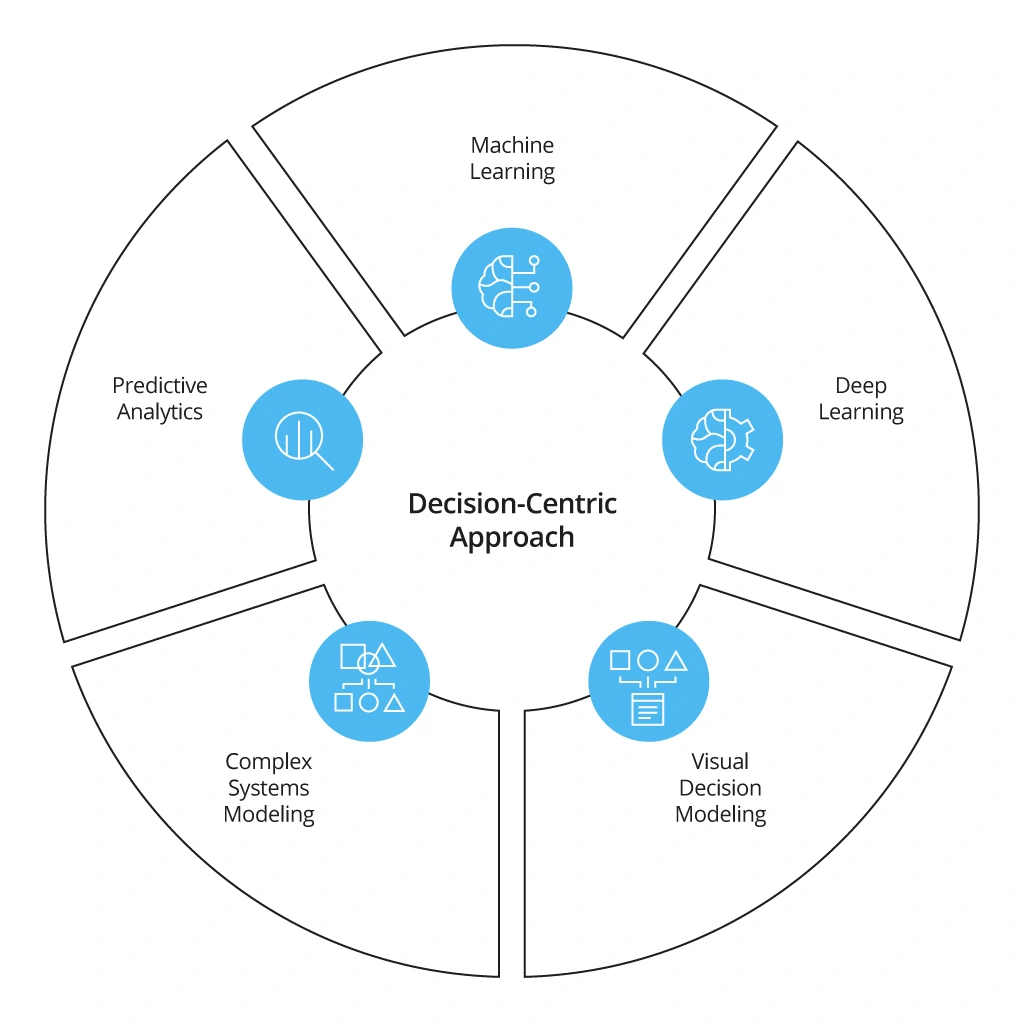Introduction to Decision Intelligence: Benefits of AI-Driven Decision-Making
According to Gartner, by 2023, 33% of large organizations shall use decision intelligence and modeling in their work processes. By 2026, organizations that create reliable, target-driven AI will enjoy more than 75% of innovative projects' success, in comparison to 40% among those that decide not to. What is the reason for such a great popularization of AI for decision-makers among modern organizations?
Let’s find out together what decision intelligence is and how artificial intelligence decision-making can create better outcomes for every decision you make for your business.
What Is Decision Intelligence?
To better explain the decision intelligence concept, let’s get started by carefully defining the decision as such. According to the Cambridge dictionary, “A decision is a choice that you make about something after thinking about several possibilities.”
When making a decision in both business and everyday life, we are usually driven by the current situation and environment, our knowledge of the issue, previous experience, partiality, emotions, desires, and intuition. Our decision can also be influenced by stereotypes, misconceptions, and the ultimately subjective perception of reality.
This is how the human brain processes the combination of external and internal factors to make a choice, and that’s why it never takes into account all of the influencing factors and can never imagine a holistic picture.
But when it comes to AI in decision making, it becomes a game-changer. The artificial intelligence system processes and analyzes huge data arrays in real time, makes smart predictions based on the historical data, and suggests the best possible decisions based on the data sets and initially specified parameters.
So, there are two main differences between human and AI decision-making:
- AI takes into account all the information available, while a human considers limited data.
- Artificial intelligence is ultimately objective and neglects emotional factors.
How Do Intelligent Decision-Making Models Work?
Decision Intelligence Model

There is a whole set of technologies and algorithms that powers a decision machine:
- Machine learning. ML algorithms work with a certain amount of structured data and make suggestions or decisions according to the specified parameters. Anti-fraud systems used by banks are the simplest example. For instance, when users access their banking app from the suspicious IP, the system decides on the necessity of additional user authentication.
- Deep learning. Deep learning is the next stage of machine learning evolution. In this case, a decision machine takes the previously made decisions and their outcomes into account when making each new suggestion.
- Visual decision modeling. AI decision-making serves as the reliable starting point, but the decisions are still made by the business owners and/or their employees. Visual decision modeling is one of the features of decision intelligence software to show the human decision-makers the available options and their outcomes.
- Complex systems modeling. One of the benefits of decision intelligence is to quickly build a complex business logic being guided by the available data and the final goal.
- Predictive analytics. The decisions AI systems make are based on quite accurate predictions. The simplest example is price prediction and automated optimization in retail. In this case, the suggestions made by decision intelligence are based on the current and historical price fluctuations, predicted demand, upcoming trends, and tons of customer behavior insights.
The Benefits of Decision Intelligence for Business
Below are five core benefits of decision intelligence solutions businesses can expect.
- Data-driven decisions. While 91% of companies believe that data-driven decision-making can boost their business growth, only 57% of them rely on their data. To get a competitive advantage, you have to correctly analyze the available data, make some predictions, and choose the best option. AI can take a better look at the data array and find invisible patterns and possible anomalies that can significantly influence the outcome.
- Faster decisions. According to the Gartner survey, 65% of decisions made lately are more sophisticated than earlier as they require more sign-offs from multiple stakeholders involved. In other words, artificial intelligence decision making can deal with the fast-paced business realm as such systems are able to process huge amounts of data almost instantly.
- Multiple problem-solving options. AI-powered decision-making algorithms can also be quite flexible and highlight several outcomes of a certain decision when one of the parameters is changed. This feature can help the business to make the best choice from a multitude of options, considering their current goals and growth strategies.
- Mistakes and biases elimination. There are at least nine types of cognitive biases (conservatism, base rate neglect, confirmation, sample size neglect, hindsight, anchoring and adjustment, mental accounting, availability, and framing) that can directly influence business decision outcomes. Decision intelligence allows avoiding them all since the correctly programmed algorithm takes an ultimately objective look at the available data.
However, do smart systems always make better decisions than humans? Although they are guided by large input data and aren’t prone to cognitive biases, they still need human verification, especially in the cases when the decision made can lead to conflicts of interest and values.
Decision Intelligence Use Cases across the Industries
Let’s find out how businesses from different industries use decision intelligence solutions to become more data-driven, sustainable, resilient, optimized, and cost-effective.
Banking and Finance
Morgan Stanley is a financial advisory company which helps its clients invest in a smarter way, supported by their in-house financial consultants and intelligent decision-making models. Their wealth management platform is powered by decision intelligence.
Proceeding from the customer’s goal (for example, investing in real estate or getting started with saving for college tuition for their children), the AI system suggests the winning strategies which are also verified by human consultants before being offered to the customer.
HSBC uses AI to enhance its investing practice. AiPEXAR, the bank’s AI-Powered US Equity Indexes, uses a three-stage process for smart investing. First, it goes over and verifies a number of US-based large and midcap publicly listed businesses, showing potential for growth.
After, the system compiles a portfolio of around 250 market players based on their highest cumulated management, financial health, and news and information scores. Finally, AiPEXAR arranges the selected list of companies, assigning each its weight in the portfolio.
Retail
The opportunity to predict better prices for the specific categories of goods, depending on the external factors, customers’ demand, trends, and sentiments is one of the simplest yet still effective decision intelligence use cases for retailers and merchants.
For example, Remi AI is the software which helps retail businesses make better pricing decisions, tailor their pricing policy to their customers’ solvency and expectations, and thereby optimize their supply chain and make their revenue volumes more predictable.
Healthcare
Enlitic Cure is a data analysis and decision-making platform created to combine the capabilities of artificial intelligence and human doctors. The decision intelligence solution allows medical practitioners to faster analyze medical imaging reports, suggest the diagnosis, and help doctors prioritize the cases to improve medical outcomes.
Energy
As for the use cases of decision intelligence in the energy sector, it’s worth mentioning Athena AI software. This system helps its users better manage their energy resources and makes automated decisions on energy and cost savings. It also predicts solar energy generation and optimizes batteries’ capacity accordingly.
One of the leading electricity distribution operators in Nordics reimagined its decision-making capabilities with a custom-made business analytics platform. With the help of their decision machine, the company can gather, structure, and analyze accurate business data from seven different sources, generate insightful reports, and make more optimized decisions.
Environment
Ecology problems, climate changes, and natural disasters caused by them are global problems, but at the micro-level, they pose businesses with severe risks. One of the benefits of decision intelligence is the opportunity to predict the possible risks being guided by the historical and current data and suggest risk management, response, and mitigation strategies with the help of AI.
One Concern is the AI decision-making platform that allows businesses to analyze and stay aware of the possible risks of environmental disasters. With the ultimate climate data analysis, they can also make better decisions on their business strategies. For example, hospitality businesses can decide on the safer location to build a new hotel, taking into account not only weather conditions but the market environment, COVID-19 situation, and customers’ demand.
Conclusion
Using business intelligence solutions powered by AI is an opportunity for businesses to make better and faster decisions within crucial business processes. In this way, the companies can not only unlock the ultimate benefits of being data-driven, but also take into account the largest possible array of relevant information when deciding on the next step.
Infopulse can assist you in developing sophisticated business intelligence solutions and perfectly tailor your decision-making platform to your current business needs with long-run projections!

![Generative AI and Power BI [thumbnail]](/uploads/media/thumbnail-280x222-generative-AI-and-Power-BI-a-powerful.webp)
![Data Governance in Healthcare [thumbnail]](/uploads/media/blog-post-data-governance-in-healthcare_280x222.webp)
![AI for Risk Assessment in Insurance [thumbnail]](/uploads/media/aI-enabled-risk-assessment_280x222.webp)
![IoT Energy Management Solutions [thumbnail]](/uploads/media/thumbnail-280x222-iot-energy-management-benefits-use-сases-and-сhallenges.webp)

![Carbon Management Challenges and Solutions [thumbnail]](/uploads/media/thumbnail-280x222-carbon-management-3-challenges-and-solutions-to-prepare-for-a-sustainable-future.webp)

![Automated Machine Data Collection for Manufacturing [Thumbnail]](/uploads/media/thumbnail-280x222-how-to-set-up-automated-machine-data-collection-for-manufacturing.webp)

